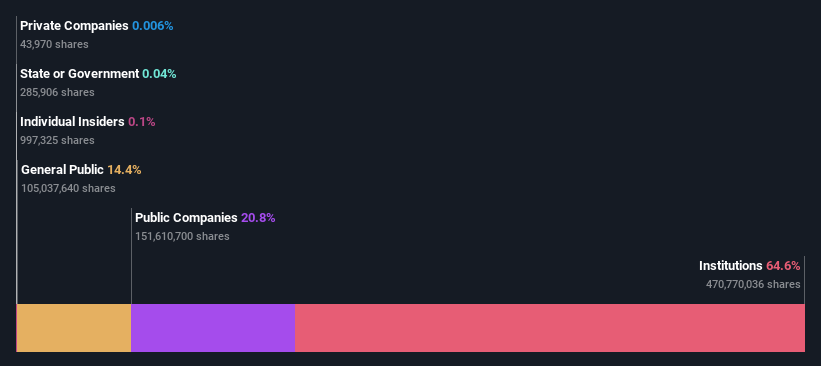With 65% ownership in American Express Company (NYSE:AXP), institutional investors have a lot riding on the business
Key Insights
Given the large stake in the stock by institutions, American Express' stock price might be vulnerable to their trading decisions
The top 13 shareholders own 51% of the company
If you want to know who really controls American Express Company (NYSE:AXP), then you'll have to look at the makeup of its share registry. The group holding the most number of shares in the company, around 65% to be precise, is institutions. Put another way, the group faces the maximum upside potential (or downside risk).
And as as result, institutional investors reaped the most rewards after the company's stock price gained 5.9% last week. The one-year return on investment is currently 13% and last week's gain would have been more than welcomed.
Let's delve deeper into each type of owner of American Express, beginning with the chart below.
See our latest analysis for American Express
What Does The Institutional Ownership Tell Us About American Express?
Many institutions measure their performance against an index that approximates the local market. So they usually pay more attention to companies that are included in major indices.
American Express already has institutions on the share registry. Indeed, they own a respectable stake in the company. This can indicate that the company has a certain degree of credibility in the investment community. However, it is best to be wary of relying on the supposed validation that comes with institutional investors. They too, get it wrong sometimes. If multiple institutions change their view on a stock at the same time, you could see the share price drop fast. It's therefore worth looking at American Express' earnings history below. Of course, the future is what really matters.
Investors should note that institutions actually own more than half the company, so they can collectively wield significant power. Hedge funds don't have many shares in American Express. Berkshire Hathaway Inc. is currently the company's largest shareholder with 21% of shares outstanding. The Vanguard Group, Inc. is the second largest shareholder owning 6.4% of common stock, and BlackRock, Inc. holds about 5.9% of the company stock.
After doing some more digging, we found that the top 13 have the combined ownership of 51% in the company, suggesting that no single shareholder has significant control over the company.
While studying institutional ownership for a company can add value to your research, it is also a good practice to research analyst recommendations to get a deeper understand of a stock's expected performance. There are plenty of analysts covering the stock, so it might be worth seeing what they are forecasting, too.
Insider Ownership Of American Express
While the precise definition of an insider can be subjective, almost everyone considers board members to be insiders. Management ultimately answers to the board. However, it is not uncommon for managers to be executive board members, especially if they are a founder or the CEO.
Most consider insider ownership a positive because it can indicate the board is well aligned with other shareholders. However, on some occasions too much power is concentrated within this group.
Our data suggests that insiders own under 1% of American Express Company in their own names. Being so large, we would not expect insiders to own a large proportion of the stock. Collectively, they own US$173m of stock. It is good to see board members owning shares, but it might be worth checking if those insiders have been buying.
General Public Ownership
With a 14% ownership, the general public, mostly comprising of individual investors, have some degree of sway over American Express. While this group can't necessarily call the shots, it can certainly have a real influence on how the company is run.
Public Company Ownership
Public companies currently own 21% of American Express stock. It's hard to say for sure but this suggests they have entwined business interests. This might be a strategic stake, so it's worth watching this space for changes in ownership.
Next Steps:
I find it very interesting to look at who exactly owns a company. But to truly gain insight, we need to consider other information, too.
I like to dive deeper into how a company has performed in the past. You can find historic revenue and earnings in this detailed graph.
If you would prefer discover what analysts are predicting in terms of future growth, do not miss this free report on analyst forecasts.
NB: Figures in this article are calculated using data from the last twelve months, which refer to the 12-month period ending on the last date of the month the financial statement is dated. This may not be consistent with full year annual report figures.
Have feedback on this article? Concerned about the content? Get in touch with us directly. Alternatively, email editorial-team (at) simplywallst.com.
This article by Simply Wall St is general in nature. We provide commentary based on historical data and analyst forecasts only using an unbiased methodology and our articles are not intended to be financial advice. It does not constitute a recommendation to buy or sell any stock, and does not take account of your objectives, or your financial situation. We aim to bring you long-term focused analysis driven by fundamental data. Note that our analysis may not factor in the latest price-sensitive company announcements or qualitative material. Simply Wall St has no position in any stocks mentioned.

 Yahoo Finance
Yahoo Finance 

